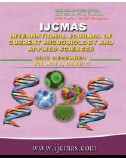


 National Academy of Agricultural Sciences (NAAS)
National Academy of Agricultural Sciences (NAAS)

|
PRINT ISSN : 2319-7692
Online ISSN : 2319-7706 Issues : 12 per year Publisher : Excellent Publishers Email : editorijcmas@gmail.com / submit@ijcmas.com Editor-in-chief: Dr.M.Prakash Index Copernicus ICV 2018: 95.39 NAAS RATING 2020: 5.38 |
Kodo millet is one of the important millet crop grown mainly in Madhya Pradesh, India. Kodo is high in nutrition value with protein, fat and carbohydrate. The physical property of kodo was determine with three variety JNK-101, JNK-364 and Niwas-1 at three moisture content 7%, 11% and 12.6% (db). It was found that L,B,T in JNK-101ranging from 2.38 to 2.68mm, 1.43 to 2 mm, and 1.01 to 1.34 mm. Similarly in JNK-364 L,B,T range from 2.27 to 2.72 mm, 1.34 to 1.75 mm and 0.96 to 1.30 mm, in Niwas-1 L,B,T range from 2.44 to 2.95 mm, 1.78 to 2.32 mm and 1.32 to 1.70 mm. The size of kodoin all three variety ranges from 1.49 to 1.91 mm, 1.43 to 1.82 mm and 1.76 to 2.24 mm respectively. Sphericity increases in all three variety from 0.63 to 0.72 mm, 0.61 to 0.67 mm and 0.72 to 0.76 mm. The bulk density, true density and porosity in all three variety range from in JNK-10, was 676.67 to 681.0, 1202.67 kg/m2 to 1228.50 kg/m2 and 43.74 to 44.57%, JNK-364 674.33 to 684.33, kg/m2, 1201.33 to 1228.80 kg/m2, 43.87 to 44.31% and Niwas -1 671.67 to 686.07 kg/m2, 1203 to 1227 kg/m2 and 44.17 to 44.13%. The angle of repose in JNK-101 25.28 to 26.07, JNK-364 25.26 to 26.04 and niwas-1 25.39 to 26.07 respectively. The physical property of kodo with all parameter increases with the increase in moisture content.
 |
 |
 |
 |
 |